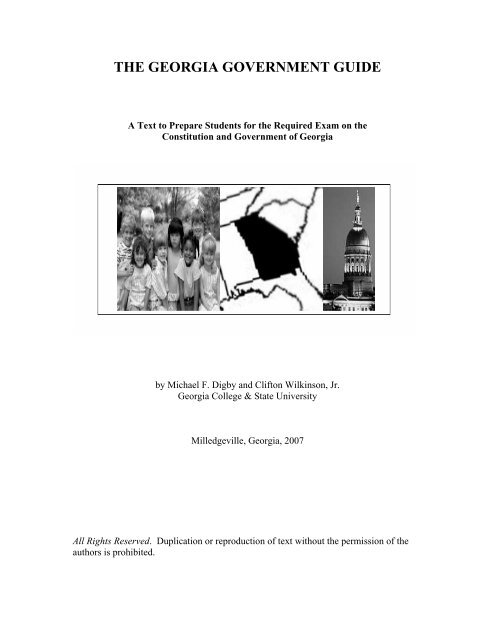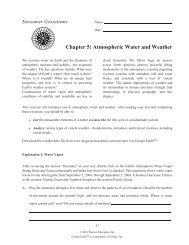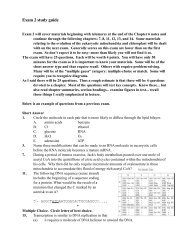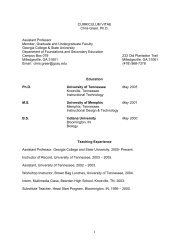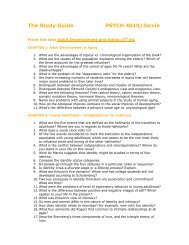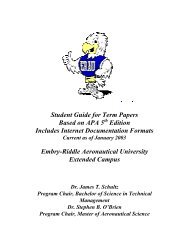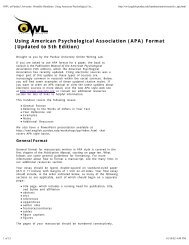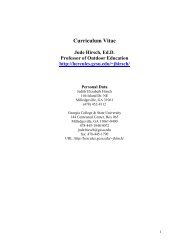THE GOVERNMENT OF GEORGIA
THE GOVERNMENT OF GEORGIA
THE GOVERNMENT OF GEORGIA
You also want an ePaper? Increase the reach of your titles
YUMPU automatically turns print PDFs into web optimized ePapers that Google loves.
<strong>THE</strong> <strong>GEORGIA</strong> <strong>GOVERNMENT</strong> GUIDEA Text to Prepare Students for the Required Exam on theConstitution and Government of Georgiaby Michael F. Digby and Clifton Wilkinson, Jr.Georgia College & State UniversityMilledgeville, Georgia, 2007All Rights Reserved. Duplication or reproduction of text without the permission of theauthors is prohibited.
PREFACEThe Georgia Government Guide is offered to post-secondary students in Georgiawho wish to prepare themselves for useful citizenship and the required GeorgiaGovernment Exam. It makes no pretence to being final. We hope it arouses the interestand whets the curiosity of students to the extent some will be encouraged to searchfurther into the processes of Georgia Government. If it assists in creating discussion orstirring debate, we have succeeded.We believe intelligent public opinion is the only hope of solution to the dailybombardment of public policy problems confronting our society. Citizens in our societywere not expected to be political spectators but active participants. Jean JacquesRousseau contended that decisions of government should embody society’s ‘generalwill’. 1 James Madison in Federalist #51 stated, “…dependence on the people is, no doubt,the primary control on the government…”. 2 Ours is not a spectator government but aparticipatory one. We must become knowledgeable and participate if we are to maintainour Republic as created by the Founders. Yet, as individuals, we seem to know less aboutour government than who won the Super Bowl or what Paris Hilton wasn’t wearing lastnight.In the belief that good citizenship is worthwhile, the Georgia General Assemblypassed a resolution in 1975 requiring students within the University System of Georgia tolearn about the public administrations of Georgia. 3 In addition, students shall pass anO.C.G.A. 20-3-68. Instruction in essentials ofUnited States and Georgia history andConstitutions.All colleges and universities sustained or in anymanner supported by public funds shall giveinstruction in the history of the United States and thehistory of Georgia and in the essentials of the UnitedStates Constitution and the Constitution of Georgia;and no undergraduate student in any college oruniversity shall receive a certificate of graduation ora degree without successfully completing course workor previously passing a satisfactory examination onthe same.exam on the Government of Georgia.Though some will think therequirement unnecessary, scholars aresurprised when non-citizens tend toperform better on Citizenship Examsthan native born Americans. 4 Ifstudents become interested in publicadministrations and carry their interestbeyond the classroom, an excellentstart toward solutions will have beenmade.State and local governmentsare important. The obligations of citizenship can best be understood in terms of localconditions. As a nation, we do not participate in state and local government elections asmuch as in national elections. 5 Yet, state and local governments affect us everyday.Driver’s licenses are totally a state responsibility and local governments mandate variouslaws such as operating hours for garbage trucks, noise regulations, and smokingprohibitions. How many times have you been driving and suddenly noticed a police car?Think local.2
Typically, candidates for national office “run against the government” – even if theyare incumbents. Presidents Ronald Reagan and Bill Clinton ranted about “big government.”In his book, Words That Work Frank Luntz stated that people responded differently to thewords “Government” and “Washington.” He stated that if an official wanted to complainabout government abuse, they needed to use the word “Washington.” Though technicallycorrect, the word “Washington” was less well received than the word “Government.” Tomost people, “government” means all public servants – the meter reader, garbage collector,or their neighborhood school board member. People respond differently to civil servants wholive down the street versus those who live in Washington, D.C. 6Americans trust local government and state government more than the nationalgovernment. Yet, when Americans think of politics and government, they are likely to havemental images of officials such as President George W. Bush, Senator John Kerry, andSupreme Court Chief Justice John Roberts. Washington D.C., however, is only the tip of thegovernment iceberg in our country. The United States has more than 87,000 units ofgovernment. While thereis only one nationalgovernment, there arefifty state governments,and thousands of the“states creatures”, 7 i.e.,local governments suchas cities, counties, andspecial districts. Thereare only 537 electedofficials at the nationallevel (435Representatives, 100Units of GovernmentType of government 1972 1982 1992 2002U.S. government 1 1 1 1State governments 50 50 50 50Local governments 78,218 81,780 86,973 87,849- County 3,044 3,041 3,043 3,034- Municipal 18,517 19,076 19,297 19,431- Township 16,991 16,734 16,656 16,506- Special district 23,885 28,078 33,555 35,356- School district 15,781 14,851 14,422 13,522Total 78,269 81,831 87,024 87,900Senators, a president, and a vice president); but there are approximately 500,000 elected stateand local government officials. There are approximately 3 million federal civilian employees,while state and local governments employ more than 18 million people.Still not convinced of the importance of sub-national government? Consider this fact:our own state of Georgia is larger in land area than England and has a greater population thanIreland, Israel, and El Salvador. In fact, approximately one-third of the countries belonging tothe United Nations are smaller and less populous than the State of Georgia.State and local governments in the United States have enormous responsibilities andtheir actions have great impact on the average person's daily life. Political scientists are fondof pointing out that the states operate the world's largest public educational system andhighway network and provide most of America's law enforcement, public health, welfare,and recreational services.This section briefly examines the major institutions and principles of the governmentof Georgia and should be of assistance in helping the reader understand state and localgovernment more generally throughout the United States. Georgia, for example, is like everyother state in that it has a written constitution and separation of powers among the threemajor branches of governmental. Every state, however, is to some extent unique - a productof its own blend of history, culture, and economic circumstances. Even though every statehas a governor, a state legislature, and a court system, in no two states will these operate withexactly the same powers, structures, and inter-relationships. While Georgia is now a fairlytypical state, the reader should understand that the system of government we will describefor Georgia would not be exactly duplicated in any other state.3
Georgia's ConstitutionOne of the political principles Americans have long held dear is that ofconstitutionalism. In essence, this doctrine means government is created by the people forcertain limited purposes which are to be spelled out in a written document. That document, orconstitution, should also describe the fundamental powers of government, the specificinstitutions that will be established to exercise those powers, and which powers or actionswill be specifically excluded from exercise by the government. Basic to the concept ofconstitutionalism is the notion that the document itself should not be easily changed.While ordinary laws usually need only a simple majority (i.e., one-half plus onemore) of the legislative body to be enacted, the fundamental law of the constitution shouldrequire something more, such as; extraordinary majority (e.g., two-thirds) of the legislatureand even an additional step requiring public approval.Both the state of Georgia and the United States as a whole have had two centuries ofexperience with constitutions. But while the national constitution has been in force since1789, Georgia's current constitution was only adopted in 1982. In fact, Georgia has had tenconstitutions since 1777, more than any other state except Louisiana. Until 1982, Georgia hadthe somewhat dubious distinction of having the longest of all state constitutions. The morethan 500,000 words of the old Georgia constitution contrasted rather sharply with the fewerthan 7000 words of the national constitution.The old constitution (actually it was relatively new, having been in force only since1977) was so long because it had been changed – amended so often. Counting theamendments carried over from the previous 1945 constitution, there were over 1000amendments in effect in 1982. Why had the constitution been amended so often? Because itwas so long to begin with. The prevailing constitutional doctrine in Georgia (and many otherstates) has been that unless the state constitution specifically allows the state government todo a particular act, the government cannot do it. At the national level, the doctrine has beenjust the opposite: the national government can do almost anything that has not beenspecifically prohibited by the constitution. So as new problems and issues arose, in Georgia,and as old problems and issues disappeared, the constitution itself had to be changed - toallow government to deal with the changing conditions. Compounding this already badsituation was the fact that there were often serious time gaps between the occurrence of aproblem and the government taking action to cope with the problem, since it is more difficultto approve a constitutional amendment than to pass an ordinary law.In the national government, where the constitution is relatively brief and general,Congress handles most new developments through the passage of ordinary laws. In Georgia,though, the constitution itself had to be amended for such reasons as to allow Fulton Countyto expand its homestead property tax exemption, to permit a state agency to change its name,and to increase the size of state scholarships to medical students. While it may be good anddesirable for Fulton County to change its property tax system, or for a state agency to changeits name, or for money to be provided to medical students, the problem was that such detailsshould not be included in any constitution. Most political scientists argue that the constitutionshould be brief and cover only fundamentals with details left to ordinary laws, so changesand adjustments can be made in a timely fashion.The new Georgia constitution, approved by a large majority of the state's voters in the1982 general election, went into effect July 1, 1983. It takes into account many of thoseideas. With approximately 25,000 words, the new constitution is considerably shorter than itspredecessor, and is designed to stay that way. The major change is in special amendments,those pertaining only to single localities (such as the Fulton County tax amendment4
mentioned earlier). Such amendments are now prohibited; only general amendments, ofstatewide application, are now allowed. Since most of the amendments under the oldconstitutions were special amendments, this prohibition should keep the size and complexityof the new constitution under control. Previously, there would be 30 to 40 proposedamendments on the ballot every general election, and twenty or so of those usually would beapproved. Since 1982, many proposed constitutional amendments have appeared on thegeneral election ballots and often there are several in a single election. The voters haveapproved most of the proposed amendments.To perpetuate the principles of free government, insure justice to all,preserve peace, promote the interest and happiness of the citizen and of thefamily, and transmit to posterity the enjoyment of liberty, we the people ofGeorgia, relying upon the protection and guidance of Almighty God, doordain and establish this Constitution.These are the stirring words in the preamble, the statement of purpose, of the GeorgiaConstitution. Following the preamble are some eleven articles, covering subjects such as thebasic rights of the individual; voting and elections; the legislative, executive, and judicialbranches; taxation; finance; education; local government; and amendment procedures. Informat, length, and content, the Georgia constitution is now very much in the mainstream ofAmerican state constitutional development. Now we will turn to discussing the majorinstitutions of Georgia state government, which are, of course, given their power and basicstructure by the constitution.The GovernorIn theory, and usually in practice, the most important and powerful person in theGeorgia political system is the governor. No other state government official is as widelyknown and recognized across the state. Some governors, -such as Georgia's Jimmy Carter,New Mexico’s Bill Richardson, or California’s Arnold Schwarzenegger, -may even receivenational attention. Why the prominence? Many reasons can be advanced.The governor serves as the titular Chief of State (Head of State), the formalrepresentative of the State of Georgia. As such, he greets visiting dignitaries and acts asspokesman for the state in dealings with other states and the national government. Thegovernor is also Chief Administrator (Head of Government), i.e., the person who is at least intheory responsible for the management of all the state's various programs and services. (Aswe will see, this responsibility often exists more in theory than in practice.) In the role asCommander in Chief, the governor has control over his own army, known as the NationalGuard, which can be called out by the governor for emergencies, such as floods, hurricanes,and riots. Georgia's governor also has a police force (the State Patrol) and a highly regardedinvestigative unit (the Georgia Bureau of Investigation) under his command.The governor’s salary, $127,303, in 2002 - is higher than the national average forgovernors, and a beautiful mansion in one of the most exclusive neighborhoods in Atlanta isprovided as his home while in office. Before his term is officially over, he can be removedfrom office only by the difficult process of impeachment and conviction by the statelegislature. (Thus far, no Georgia governor has ever been impeached; however, the governorof Arizona was impeached and removed from office in 1988, and the governors of Alabamaand Arkansas have been forced to resign in recent years due to criminal charges.) The officeof governor can be a springboard for national office; over the past 30 years, half of thenation's governors have gone on to become federal judges, ambassadors, U.S. Senators,5
One of the primary tools any chief executive can use to shape and control governmentadministration is the power of appointment. By naming the heads of government agencies,the executive can have those agencies directed by people who are tuned in to his ideas andpreferences. In turn, these individuals owe their jobs to staying tuned in and so they see to itthat their agencies act as the chief executive desires in implementing programs. Of course,the degree to which the chief executive is successful depends largely upon his personalqualities of leadership and persuasion in getting subordinates in the various departments tofollow his lead. In some states this appointment power gives the governor great control overadministrative operations; it is certainly one of the major sources of the president’s powers atthe national level. In Georgia, however, the governor’s appointment powers are quite limited.One national survey rated Georgia’s governor among the weakest in the country inappointment powers. The reason is that several executive departments in Georgia are headedby elected officials (e.g., the Secretary of State) who are independent of the governor; stillother agencies are governed by policymaking boards which have the power to name agencydirectors. In actuality, the governor does have some, and often substantial, power andinfluence in those departments, but his powers are based on informal rather than formalsources--i.e., his ability to lead, persuade, and bargain, and on the willingness of others to beled, persuaded, and bargained with.Before Governor Jimmy Carter reorganized the executive branch in 1972, it was evenmore difficult for the governor to “run” state government. There were more than 300 separateexecutive agencies when Carter took office, and numerous agencies could be involved in asingle function of government, such as public welfare. Obviously no one person couldsupervise such a huge number of bureaucracies; and citizens could have major difficultiestrying to get a problem solved or a service provided from such a hodge-podge of agencies.Governor Carter reduced the number of agencies to 22 departments (a few more have sincebeen established) along the lines of the “one-stop shopping” concept. That concept providesthat one broad function of government, such as public welfare, should be handled by oneagency, such as the Department of Human Resources. Some commentators have criticizedthe huge size of some of the resulting departments, especially this same Department ofHuman Resources, but without a doubt the reorganization made the executive branch simplerin structure, more easily comprehended by the public, and better managed by the governorand the department heads.Many political scientists believe the governor’s power over state fiscal affairs (i.e.,raising revenues and spending funds) is even more important as a policy-making andmanagement tool than the appointment privilege. In Georgia, this is almost certainly true. Animportant source of the governor’s fiscal powers is the Office of Planning and Budget (OPB),the only state agency over which the governor’s supervisory control is complete. The dutiesof the OPB center on helping the governor draw up both short- and long-range plans for thestate in the shape of the executive budget. This document predicts how much money will beavailable for state spending in the next fiscal year and then specifies how much should bespent for various programs by every executive agency. The process through which theexecutive budget is developed is a complex one, beginning a full 16 months before the fiscalyear commences and involving hundreds of requests, communications, consultations, andnegotiations between, on the one hand, the governor and OPB, and, on the other hand, thevarious executive agencies. For example, work on the Fiscal Year (FY) 2008 budget began inthe spring of 2006. The proposed budget was finalized in the late fall of 2006 and had to besent to the General Assembly in January 2007 within five days of the legislature's convening.After consideration and approval by the legislature, the budget will go into effect on July 1,2007 and will continue in force until June 30, 2008. Although the governor's budget is7
technically a proposal and thus subject to change by the legislature, it usually becomes lawwith only relatively minor (albeit highly publicized) revision. Thus, through his participationin the budgetary process, the governor can do much to define the nature of governmentactivity in forthcoming years.Governors are not only involved in just executing or implementing laws; they are alsoactively involved in the process of making laws. In fact, some political scientists call thegovernor the state's Chief Legislator. There are several major elements to the governor'spower in this area. During each legislative session, the governor may address the legislatureto present his views, propose bills, and call for cooperation. While the governor cannotformally propose bills as bills must be formally introduced by members of the legislature,many legislators are eager to do so. Bills passed by the legislature can be rejected, or vetoedby the governor. A two-thirds majority of both legislative chambers is required to over-ride aveto. No gubernatorial veto in Georgia has been over-ridden in nearly 30 years. After a billhas been passed by the legislature, the governor must make his veto decision within six days,if the legislature is still in session, or 40 days, if the legislature has adjourned. If the governortakes no action within these time frames the bill automatically becomes law. Moreover, thegovernor also has a line item veto, i.e., a specific item veto, on appropriations (budget) billswhich enables him to reject a particular expenditure program without having to veto thewhole bill which might include other programs he strongly favors. The U.S. president doesnot have line-item veto authority, and an attempt by Congress to grant a version of it to thepresident was recently declared unconstitutional. 8 It can be fairly stated that presidents havehad a highly developed sense of veto-envy regarding this aspect of gubernatorial powers.The governor can also control the very convening, or meeting, of the legislature tosome degree. He can call a special session of the legislature to consider only those issues hehas denoted. For example, legislative approval of the new state constitution came during aspecial session held in the summer of 1981, and in 1989 a special session was held to changea provision in the state income tax law that was believed to be in violation of a U.S. SupremeCourt decision. The redrawing of Georgia’s state legislative and congressional district lines,required after every census, is often done during a special session called by the governor.A final component of gubernatorial power (one of the great mysteries of politicalscience is how the adjective of governor became gubernatorial!) is composed of the purelypolitical resources available to the office. As the most prominent elected official in the state,the governor is automatically the formal political Party Leader. Until the election of George“Sonny” Perdue in 2002, Georgia had had Democratic governors for 130 years. This was thelongest single party domination of a governorship in the nation’s history. (See Table 1 for alist of recent governors, their political party, and hometowns.) In addition to the governorshipcoming into Republican hands in 2003 with the inauguration of Governor Perdue, the stateSenate also became a majority GOP institution. The state House of Representatives followedsuit in 2005. Historically, more than any other person, the governor has influence on hisparty’s platforms, finances, and nominations. He is in a position to lend assistance tolegislative and executive candidates he favors and to denyassistance to others. The governor’s party role, therefore, enhances his power in the statelegislature and throughout the executive branch. This power is not complete, however. Thetwo main parities in Georgia are broadly based and have candidates and voters of manydifferent values and ideologies. There are often battles among individuals and factions withinthe party that are as serious as struggles that often take place between the two separateparties. For Democratic governors in the recent past, there was rarely an opportunity to lead atightly-knit party that would follow the governor’s lead. Since the election of a Republican8
Commissioner of Agriculture Tommy Irvin has held his post for over 20 years and is nowworking with his sixth governor.To complicate matters even more, most of the other state agencies (i.e., those notheaded by elected executives) are formally headed by policy-making boards, and not by thegovernor or a single person appointed by the governor. The boards of these agencies, rangingin size from three to 20 persons, are appointed by the governor (with one exception), but hispower over them is by no means absolute. Many board members have terms of office notconnected to the governor’s term of office. Terms of office for these board members aretypically for five, six, or seven years, and their duration is often staggered (e.g., in a fivememberboard, two could be appointed this year to begin six-year terms, two othersappointed the following year to begin six year terms, and the final one appointed in the thirdyear to serve a six year term). Such procedures mean a majority of a board’s membershipcannot be named all at once by a particular governor; change in a board must be gradual. Asa result, well into a governor’s first term, policy in important agencies such as theDepartment of Human Resources (the welfare agency), the Department of Corrections (theprison agency), and the Department of Natural Resources (the wildlife and environmentalprotection agency) can be made by board members appointed by his predecessor and notnecessarily favorable to the current governor’s ideas.Most of the governor’s appointments must be approved (or confirmed) by the StateSenate before the appointees can take office. Occasionally, the principle of legislativeinvolvement is carried further: some boards and officials in the executive branch areappointed directly by the state legislature, and some legislative officers hold membership oncertain executive policy-making boards.Consider these two examples of how the executive power of Georgia’s governor hasbeen diluted. First is the Board of Regents, which supervises the University System ofGeorgia. The Board of Regents is the final authority on matters such as what programs can beoffered at particular colleges, what courses are required in the core curriculum, who is hired,fired and retained as college faculty and administrators, and what the monetary charges willbe at all state institutions. The members of the Board of Regents are nominated by thegovernor and confirmed by the State Senate. Their term is seven years, so membersappointed as much as three years before a particular governor is elected can continue toexercise authority throughout a new governor’s first term. The Chancellor, the chiefexecutive officer of the University System, is chosen by and serves at the pleasure of theBoard of Regents, not the governor’s.A second example is the Department of Transportation (DOT), which supervises thestate’s highway system. The policymaking board of the DOT is chosen by the statelegislature and is comprised of, one member from each of the state’s congressional districtsselected by the state legislators whose constituencies lie within the same congressionaldistrict. The DOT board members in turn choose the department’s chief administrator(Commissioner). In these two major areas of state action, the governor apparently has onlylimited formal influence over state policy. As an interesting sidenote, both the Commissionerof Transportation and the Chancellor of the University System have salaries higher than thatof the governor.In all fairness, however, it should be noted that these limits on executive andadministrative power do not totally tie the hands of the governor. The intent of theseconstraints is not to abolish executive power, but to check executive power so it cannot beeasily abused. Within those checks, it is still possible for an able and energetic executive toleave his mark on government. Above all else, the governor’s budgetary powers give himconsiderable say over the workings of the various state agencies. Moreover, most governors10
have been thoroughly tested in the political waters. They are professional politicians in thetrue sense of the term. That is, they are individuals who have shown over time that they areable to bargain, negotiate, and persuade others to their points of view.The LegislatureGeorgia’s constitution places the legislative, or law-making power of the state in theGeneral Assembly, a body currently composed of 236 people serving in a Senate and a Houseof Representatives. The duties and functions of the state legislature are quite numerous andbroad. Traditionally, the primary function of these bodies has been to enact statutory law, i.e.,to consider and pass bills designed to address various problems existing in the state. Whilethis function is traditional, it is still a constantly growing and developing one. Consider this:in the 1950s, there were approximately 500 bills per year introduced into the averageAmerican state legislature with approximately 300 bills being approved; now the averagefigures are 2000 bills introduced and 1000 approved each year. In Georgia, the number ofbills introduced increased by about 80 percent between 1970 and 2000, from 1000 to almost1800; the number passed also increased, but at a slower rate, from 600 to 700.The subjects considered by the Georgia General Assembly in its law-making functionare of an infinite variety, ranging from changing Georgia’s nickname to the Peanut State tochanging the type of evidence required for conviction in a rape trial, from whether $10,000should be appropriated to increase the pension of retired judges to whether $3 billion shouldbe spent for public education. Approximately one-half of the bills passed by the statelegislature do not even apply to the state as a whole but rather are special bills affecting onlyparticular cities and counties. Regardless of the subject, nearly every bill the state legislatureconsiders is of vital importance to some people because it can affect, in good and badways, their daily lives and livelihood.Law-making is a very important function, but it is by no means the only functionperformed by the General Assembly. A second crucial function is legislative oversight of thevarious executive branch agencies. The Assembly can investigate the actions of stateagencies to assess the efficiency, effectiveness, and honesty of agency performance. Ifdissatisfied with an agency’s performance, the Assembly can through legislation change theagency’s programs and authority and can reduce its budget. Third, the Senate has the powerto confirm nearly all of the governor’s appointees to the executive branch boards, bureaus,and commissions we discussed earlier. The Assembly also has power to directly appoint thestate auditor and the members of the State Transportation Board. Fourth, the Georgia Houseof Representatives has the power to bring formal charges of misconduct (i.e., impeachment)against a state official; the official then must be tried by the Senate and, if convicted, will beremoved from office and barred from ever serving in any other state post. This is a little-usedfunction but its existence does give the legislature some potential leverage over officials inthe executive and judicial branches. There are several other functions performed by the statelegislature from time to time: it proposes to the voters amendments to the state constitution; itvotes on proposed amendments to thenational constitution; and it draws up district boundaries for both state legislative andnational congressional seats (subject to federal court approval).One of the most important jobs of the state legislature and of individual legislators issimply to represent and serve the public. This last function includes such varied activities as:making speeches at various clubs and gatherings, contacting state agencies to iron outproblems or claims constituents may have, providing information and interviews to the news11
media and to interest groups; answering letters and telephone calls from citizens complainingabout such things as taxes being too high or school teachers salaries being too low, andsomehow voting in the state legislature after balancing the views of interest groups, theconcerns of constituents (when those concerns can in fact be determined), the pressures offellow legislators and the governor, and the legislator’s own personal opinions. Obviously, itis very difficult for a legislator to perform such services while trying to fulfill the otherfunctions as well. Yet carrying out such constituent services is a necessity if a legislatorwants to be re-elected every two years. (There have been attempts to increase the term tofour years, but voters have rejected this proposed amendment to the constitution several timesover the past two decades.)What sort of person would not only do this job but actually seek it with some degreeof enthusiasm? First, most state legislators are part-time politicians who are employed fulltimein other fields; the pay of a state legislator in Georgia (about $16,000 per year plusexpenses) is generally not sufficient as the sole source of income. The typical legislator is awhite male (after the 2006 election, just under 20 percent of Georgia's 236 legislators werefemale and about 22 percent were African-American); a lawyer, businessperson, or farmer(29 attorneys, 8 business owners, 34 businesspersons, 6 farmers, 11 insurance related, 4pharmacist, 3 teachers, 1 pastor); and a college graduate (in 2000, about 75% of thelegislators had graduated from college.) In terms of social characteristics, Georgia'slegislators do not strongly resemble the overall population of the state. Is this bad? Shouldmore legislators be female, or black, or from other occupations? Political scientists havemixed views; most would argue that legislators should be roughly representative of theirconstituents (at least in attitudes if not in gender, race, etc.,) but they also add that very fewpolitical systems have ever had a perfect match between the social characteristics ofgovernmental officials and of the public.Historically, the typical member of the Georgia General Assembly was a Democrat.Like the governorship, Democrats controlled both chambers of the legislative branch fromReconstruction until 2002. As Table 3 demonstrates, Republicans have made tremendousgains in recent years. After the 2002 elections, the state Senate became majority Republicanfor the first time since the 1870s. The outcome of the 2004 elections gave Republicanscontrol of both houses of the General Assembly as the GOP picked up 27 House seats andwon three additional seats in the Senate. With the start of the 2007 legislative session,Republicans are in control of the General Assembly, the Lt. Governor’s office and thegovernorship and are well positioned to accomplish a policy agenda.TABLE 3: Partisan Change in the General AssemblySenate (56 total)2001-03 2003-05 2005-07 2007-09Democrats 34 26 23 22Republicans 22 30 33 34------------------------------------------------------------------------------------------------------------------------------------------------------------------------------------------------------------------------------------------------House (180 total)Democrats 103 108 81 74Republicans 77 72 99 106------------------------------------------------------------------------------------------------------------------------------------------------------------------------------------------------------------------------------------------------% Republican 42% 43% 56% 59%of total members12
Georgia's General Assembly is bicameral--having two chambers--as are the nationalCongress and all other state legislatures except Nebraska's. A common question is why is itnecessary to have two legislative chambers. Wouldn't one be enough? The customary answer,at the national level anyway, is that bicameralism allows for two different types ofrepresentation and thus two different perspectives, one based on political or geographic units(e.g., the states in the U.S. Senate), and the second based on people or population (e.g., thecongressional districts in the U.S. House of Representatives). Until the 1960s, many statelegislatures, including Georgia's, were based on this logic, with their upper chambersrepresenting counties and their lower chambers representing people. The U.S. SupremeCourt, however, declared such arrangements at the state level to be unconstitutional. Now inall state legislatures the basis of representation in both chambers is population: within eachchamber, all districts (i.e., the areas from which legislators are elected) must have equalpopulations ("one-man, one-vote," in the words of the Court). Accordingly, after each censusthe district lines must be re-drawn in order to reflect population growth and decline.If the customary answer is no longer valid, then why do we continue to havebicameral legislatures? Probably the best reason for bicameralism is that by having every billpass through two separate houses each chamber can serve as a check on the other, meaningbills can be examined more carefully, mistakes avoided, and hasty and ill-considered actionprevented. However, critics argue that the duplication of effort often serves little purpose butto delay action the public wants or to provide interest groups with additional ways to blockaction they dislike. Furthermore, most legislation is passed in the last week of the session,often in a mad-house atmosphere that makes serious deliberation difficultindeed. At any rate, Georgia’s legislature has had two chambers ever since 1789, and thetradition will almost certainly continue. Tradition can be a strong force, and since no oneknows what the outcome would be if the legislature were made unicameral, the strength oftradition is understandable.The Senate is usually called the “upper house,” because there are fewer Senators andtheir eligibility requirements are slightly higher than those of the House of Representatives(which is, then, the “lower house” or, sometimes, “the House”). Senators must be at least 25years old and residents of Georgia for at least two years; representatives need only be 21years old and state residents for two years. Both senators and representatives must be U.S.citizens and residents of their respective districts for one year. The 1982 Constitution fixesthe size of the Georgia General Assembly at a maximum of 56 state Senate seats and aminimum of 180 House seats, making Georgia’s General Assembly considerably larger thanthe typical state legislature. (Florida, for example, is closer to the average, with 50 Senateseats and 110 House seats.)Technically, in the process of considering bills all state legislators have the samevoting strength--i.e., one vote per delegate--and therefore the same effect on legislation. Inreality, however, a few individual legislators have far more power in practice than others.Without much doubt the legislators with the greatest amount of power and influence are thepresiding officers: The Speaker of the House, who is elected by the other House members,and the Lieutenant Governor, who serves ex officio (i.e., by virtue of the office) as Presidentof the Senate. Their strength comes from two primary sources. First, as presiding officers,they have the formal authority to keep order in their respective chambers, to recognize thosewishing to address meetings of the entire chamber (i.e., to address the floor), and to direct thespeed and order in which bills will be considered. Their second source of strength is centeredaround their abilities to control the actions and memberships of the standing committees, thebodies that handle most of the real work of legislation in each chamber of the Assembly.Both the Speaker and the President determine for their respective houses the committee to13
which each bill will be referred for study and recommendation, and thus they cansignificantly shape how bills will be treated. Moreover, the Speaker and Senate Presidenthave the power to create subcommittees, name committee and subcommittee chairmen, anddetermine the assignment of newly elected legislators to committees. The Speaker also servesas an ex officio member of all House standing committees. It should be emphasized that,unlike the custom in Congress, state legislative committee chairmen hold their positions onlyas long as the presiding officers want them to; it is not at all unheard of for a chairman whohas not been sufficiently cooperative with the presiding officer to be deposed from hischairmanship. Most chairpersons tend to be very attentive to the wishes of the Speaker orSenate President. It should be reiterated, however, that the powers of the Senate Presidenthave been affected by the fact that beginning in January 2003, the Senate was controlled bythe Republican party while Senate President (the Lieutenant Governor) Mark Taylor was aDemocrat. The Republican majority placed limits on the President’s ability to lead theSenate, especially in the area of controlling committees. However, when Republican CaseyCagle was elected Lt. Governor, many of the powers were restored.A few other individual state legislators are powerful by virtue of holding variouspositions. The House Speaker Pro Tempore (or Pro Tem) and the Senate President ProTempore are elected by their respective chambers to serve as presiding officers in the absenceof the Speaker or lieutenant governor. The Majority Leader and Minority Leader, and theirassistants called Whips, play important roles by speaking for their respective political parties,working to adopt party stands on bills, and encouraging their colleagues to support and votethe party line on major bills. Another important post is the Administration Floor Leader ineach house; they are chosen by the governor to serve as his spokesmen and to manage theconsideration of his legislative programs. Their close ties to the governor, and thus thegovernor’s various resources, enable them to be powerful negotiators and bargainers.Legislators who do not hold one of the preceding positions try to maximize theirimpact on state affairs by service on the various standing committees. Each legislator isassigned membership on three or four of these permanent committees, usually after havingearnestly fought for membership on those handling subjects of great interest to herconstituents. For example, a state representative from a farming area may seek membershipon the House Agriculture and Consumer Affairs Committee.It is only in the standing subject committees that any sort of detailed attention can bedevoted to examining the hundreds of bills introduced each session. In truth, only a smallproportion (perhaps one-third) of the bills introduced are studied and analyzed; most billsreferred to committee are pigeonholed (or shelved) and never again see the light of day.Nearly all such bills are either basically flawed, and undeserving of serious attention, or areso controversial that compromise is impossible, at least in the short run. Sometimes bills areshelved in order to allow more time to pass so passions can die down or so public opinionbecomes more clear. An important bill with a realistic chance of success will usually becarefully studied and shaped in the subject committee, then sent to the Rules Committee tothe placed on the calendar for floor action, and finally sent to the floor along with the subjectcommittee’s recommendation of “do pass” or “do not pass.” The floor, where the totalmembership of the chamber votes, usually accepts the committee’s recommendation. Ifapproved by the floor, then the bill must go through the same process in the other chamber. Afurther complication is that before a bill is approved by the General Assembly and sent on tothe governor, it must first pass in both chambers with exactly the same wording. If the Senateand House versions are not identical, then a Conference Committee with both House andSenate membership is appointed by the presiding officers to negotiate a compromise.14
Judging from newspaper and television coverage, the legislative process is the state’smost popular spectator sport between the months of January and March when the GeneralAssembly is in session. It is a complicated process, filled with roadblocks and delays, andrequiring in the successful legislator substantial quantities of stamina, patience, andbargaining skills. But remember that a state legislator also must carry out both herrepresentative and service functions, work which can take an enormous amount of time andwhich might call for totally different types of personal characteristics. A good legislator mustnot only be adept in the skills of making laws, but must also be talented in public relationsand be willing to carry out the constituent services parts of the job. This combination ofcharacteristics is quite rare, which is why good state -- or national -- legislators are sovaluable, yet often also controversial. The public and news media often do not seem tounderstand the need for good politicians or the qualities necessary for an individual to be agood politician and legislator.The JudiciaryThe third branch of Georgia’s government is composed of approximately 1000 courtsthat are empowered to interpret and apply state law to resolve conflicts. The precedingsentence has two important points to it. First it refers to the basic function of the judiciary: toresolve conflicts by interpreting and applying the law. This is obviously a very importantfunction. Judging by the astronomical increase in the last couple of decades in the number ofcourt cases, this function is becoming even more important. Moreover, it is a function that isfundamentally political in nature. The courts, then, are political bodies that are involved inconflicts, engage in compromise, allocate values, and determine who gets what, when andhow. In this regard, the courts are no different than the legislative and executive branches.What makes the judiciary different from the other branches is the procedures the courts use inpolicy-making. Courts are passive and must wait for problems to come to them; access to thecourts is restricted to certain types of problems (justiciable cases) handled by people withcertain specialized training (lawyers). Although the courts make great attempts to appearnon-political, objective, and neutral, they still are involved in the settlement of major politicalquestions such as: how public schools should be organized and financed; whether abortionswill be allowed and paid for with public funds; and whether cities, counties, or the state itselfhave the lawful authority to undertake various programs. The judiciary also, of course, settlessuch questions as whether a certain individual should be found guilty of a particular crime(i.e., criminal cases) and whether one person’s actions have damaged the interests of another(i.e., civil cases).The second important point in the opening sentence is the reference to the number ofcourts in Georgia (approximately 1000), a high figure which places Georgia close to the topof the nation. Before the 1982 constitution, there were even more than twice as many courts.The new constitution abolished, consolidated, and re-named several different classes ofcourts. The objective was to bring order and clarity into the state’s judicial system, in whichconfusion and duplication, and sometimes amateurism, had become embedded. There wereso many courts, with seemingly uncertain and overlapping jurisdictions, that the averagecitizen would often have no idea what court was responsible for particular types of cases.And since legal professionals are expensive, many judicial positions at the local level werefilled by “amateurs” (i.e., non-lawyers).Under the 1982 constitution, there are now seven classes of courts in Georgia: theSupreme Court, the Court of Appeals, Superior Courts, State Courts, Juvenile Courts, ProbateCourts, and Magistrate Courts. Except for the Probate court, each of the classes now hasuniform jurisdiction. That is, courts of the same class throughout the state now hear the same15
type of cases. In the past, a case that might be suitable for, a state court in one county wouldbe excluded from a state court in another county. The Supreme Court is authorized toestablish uniform rules of practice and procedure for each class so that the actual handling ofcases -- kinds of evidence, permissible motions, requirements for decisions, and so on – isstandardized. Selection procedures have also been changed by the new constitution so thatfour of the classes of courts - Supreme, Appeals, Superior, and State--are now chosen in nonpartisanelections, where candidates are not listed as Democrats or Republicans. The otherthree classes of courts continue to have partisan elections.As the vast number of courts indicates, Georgia’s court system is a complex one.Probably the best way to categorize the courts is by their jurisdictions or the types of casesthey consider. Courts can have appellate jurisdiction (i.e., hear cases which were previouslytried by other courts), general trial jurisdiction (i.e., most criminal and civil cases), or limitedtrial jurisdiction (i.e., only specified cases). The chart shown in Figure 1 gives a better idea ofthe organization of Georgia’s judiciary.FIGURE 1: Georgia’s Court System*GA Judicial ChartGeorgiaSupreme CourtCourt ofAppealsJuvenileCourtSuperiorCourtStateCourtProbateCourtMagistrateCourtVariousMunicipal Courts*Note: Some cases appealed from the Superior, State and Juvenile courts go directlyto the Supreme Court. Most, however, are sent first to the Court of AppealsThe appellate courts in Georgia are the Supreme Court, now composed of sevenjudges (the constitution allows, but does not require, nine judges), and the Court of Appeals,composed of nine judges. All sixteen appellate judges are chosen through statewidenonpartisan elections for six-year terms. The appellate courts hear cases previously decidedby trial courts in which one of the parties in the dispute claims that errors or oversights hadoccurred. Usually an appeal is first sent to the court of Appeals and then goes to the SupremeTABLE 4 : <strong>GEORGIA</strong> SUPREME COURTJUSTICESChief Justice Leah Ward Sears, Savannah (JD – Emory)Presiding Justice Carol w. Hunstein, Dekalb County (JD - Stetson)Justice Robert Benham, Cartersville (JD - UGA)Justice George H. Carley, Decatur (JD - UGA)Justice Hugh P. Thompson, Milledgeville (JD – Mercer)Justice P. Harris Hines, Atlanta (JD - Emory)Justice Harold Melton, Washington, D.C.; East Point (JD - UGA)Court only if the contestingparty is still dissatisfied withthe outcome. A few cases--those involvinginterpretation of the federalor state constitution orcapital crimes (i.e.,punishable by death) - godirectly to the state SupremeCourt after trial. The state16
Supreme Court is the court of last resort for interpretation of the state constitution. TheSupreme Court is also the appellate court for cases involving divorce and alimony and landownership titles. The Supreme Court now has the authority to exercise some administrativesupervision over the state’s legal system. The high court can propose rules for lower courts,set standards of conduct for judges, set rules covering the removal or discipline of judges,and regulate the admission of attorneys to the State Bar (i.e., certify that an attorney canpractice in the state of Georgia).The primary trial courts in Georgia for criminal and civil cases are the Superiorcourts. The state is divided into 48 Superior court circuits, most of which cover severalcounties. Each circuit has at least one Superior court judge, and most have several (theAtlanta circuit has eighteen). The judges of a circuit will "travel the circuit," i.e., will holdcourt in each county of the circuit a specified number of days each month. The Superiorcourts have exclusive trial jurisdiction in cases involving felonies, divorces, and ownership ofland, and they also serve as appellate courts for most of the lower courts. Currently, superiorcourt judges are elected to four-year terms in non-partisan campaigns in their circuits.However, this system has been challenged in federal court as being racially discriminatory.The claim is that having all judges of the same circuit elected by the whole circuit givesdisproportionate power to the racial majority; minorities will be out-voted in election afterelection. Some experts have called for changing to the "Missouri Plan," in which thegovernor would appoint the Superior court judge, and voters at the next election would thenchoose to retain or reject the judge with no opponents listed on the ballot. If rejected, thegovernor would appoint another judge who would go through the same process. Advocates ofthe Missouri Plan argue that governors are better evaluators of judicial qualifications than thegeneral public and would be more likely to appoint a racially balanced judiciary.Also elected in the Superior court circuit is a District Attorney(DA), who serves as thestate's representative (the prosecution) in criminal cases. The DA presents evidence ofcriminal conduct to a Grand Jury ("grand" means large, having 16 to 24 persons) which mayissue indictments, or formal accusations. The DA will serve as prosecuting attorney in theSuperior court trial--if in a fact a trial is held. Most criminal cases (over 93%) conclude inplea bargaining, before the trial is held, with the defendant pleading guilty to a crime oflesser magnitude, and lower penalty, than that with which he was first accused. Rather thanarguing cases before a trial judge and a petit jury ("petit" means small, or 12 persons), themajor job of the DA is actually to negotiate bargained pleas.By far most courts in Georgia are those of limited trial jurisdiction, responsible onlyfor narrow types of cases. In about half of Georgia's counties, State courts have beenestablished to handle misdemeanor criminal cases and most civil cases. State court judgesmust be attorneys and are chosen in non-partisan elections for four-year terms. In somecounties, separate Juvenile courts have been established to decide cases involving suspectswho are less than 17 years old. The judges of the separate Juvenile courts are usuallyappointed by the Superior court judge in their county. They must be attorneys, and they servefour-year terms. In other counties, the Superior court judge also serves as theJuvenile court judge.Every county in Georgia must have a Probate court, which is given a grab-bag offunctions. The duties of Probate court judges include handling wills and estates of deceasedpersons, disposing of some traffic violations, issuing marriage licenses, supervising elections,and committing people to mental hospitals. Probate judges are elected to four-year terms and,except in counties with populations over 100,000, are not required to be lawyers.One of the major changes brought about by the 1982 constitution was theconsolidation of hundreds of small local courts, especially the old justices of the peace and17
small claims courts, into a new class of court. Now each county has one Magistrate court,with a chief magistrate and additional magistrates if needed. Magistrates hear cases involvingminor civil disputes and county ordinances. They also have other duties such as issuingsearch and arrest warrants, peace bonds, and summonses. In most counties, the chiefmagistrate is elected to a four-year term, and other magistrates can be appointed by the chiefmagistrate subject to Superior court judge approval.In addition to the seven classes of state courts (also known as constitutional courts),most of Georgia's cities have their own courts, known by various names, such as mayor’s,recorder’s, or police courts. Such courts, commonly referred to as municipal courts, were leftuntouched by the 1982 constitution.Georgia’s court system has been roundly criticized in the past for its complexity andconfusion. The framers of the 1982 constitution sought to correct many of the problems. Thejudicial system in Georgia is still complex, but the new organizational classification, the newuniformity of jurisdiction, and the enhanced ability of the Supreme Court to provideadministrative oversight, are all genuine attempts to improve the quality of justice in Georgia.Local GovernmentA state is a large place with many people living in different environments. In order toadjust government programs and services to the diverse conditions, the state has provided forthe establishment and operation of local general governments, such as counties and cities,and special governments, such as school districts and special districts. All local governmentsare “creatures of the state,” meaning the state government creates them, retains sovereigntyover them, and can change or abolish them. According to the legal doctrine known asDillon’s Rule, local governments can only perform those duties explicitly delegated to themby the states.Georgia has 159 counties, more than any other state except Texas. These counties areadministrative subdivisions of the state, created to provide services the state wants to beimplemented locally. Traditionally, counties have provided only a few basic public services,such as law enforcement, road maintenance, and property transaction record maintenance.Some elected County Commissioners are still referred to as Road Commissioners. In recentyears, however, many counties have greatly expanded their public services into fields such asrecreation, sanitation, and economic development. The primary governing body of a Georgiacounty is the Board of Commissioners, usually composed of three or five elected memberswho jointly possess both executive and legislative (including fiscal) powers. Officials such asthe tax commissioner, coroner, sheriff, and various judges are also usually elected and sharepowers with the commissioners. However, most of the budgetary powers reside with theelected board of commissioners. The structure of county government is now changing greatlyin many parts of Georgia. The election of a county chief executive (along withcommissioners) and the consolidation of governmental functions with cities are among themore common reforms.Municipalities – cities have been established in areas of high populationconcentrations. Having a lot of people in a small land area creates needs for public servicesincluding - more intense law enforcement, fire protection, sanitation, animal control, streetlights, etc. Traditional county governments were unable or unwilling to provide theseservices. To handle these greater service needs, states have granted charters (a type ofcontract or constitution) to municipal corporations, thus creating a city government anddefining its powers and structures. Most Georgia cities have some variation of the mayorcouncilform of government, with the legislative power being placed in the council(commonly with five to nine elected members) and the executive power in an elected mayor.18
A growing number of cities use the council-manager form which places administrativepowers in the hands of a professional city manager hired by the council. 9In Georgia, as in most other states, cities are still part of the county within which theyare located, but because of their charter, cities are able to provide additional services andraise their own revenues. As noted above, counties are now expanding their services and, infact, becoming more like traditional cities. As a result in many areas of Georgia there issubstantial talk about the need for city-county cooperation or even consolidation. The city ofColumbus and Muscogee County consolidated into one common government in 1971. In1990 the city of Athens and Clarke County approved a similar merger, and Augusta andRichmond County followed suit in 1995. In other parts of Georgia, consolidation proposalshave been voted down.The largest form of local government, at least in expenditures, is the school district.Every county in Georgia (and a few cities) has a public school system run by an electedschool board that appoints a professional superintendent. There is variation from place toplace, but the general rule is for school systems to be nearly totally independent of other localgoverning bodies. The school board has the power to raise revenue by levying property taxesand to make policy on the operation of the public schools, within state guidelines.The last form of local government is the peculiar animal known as the special district,which is a government formed by other governments, especially cities and counties, to carryout a specific service. The Metropolitan Atlanta Rapid Transit Authority (MARTA) isprobably the best-known example of a special district in Georgia. It was formed by jointaction of the state, the counties of Fulton and DeKalb, and the city of Atlanta, to operate amass transit system of buses and monorail trains in the Atlanta area. Its board of directorscan set its own fares and policies and is not subject to the orders of any of the localgovernments involved. There are several hundred special districts in Georgia, established tocarry out single services such as water, sewer, recreation, and transportation. They varysubstantially in structure and degree of independence.State and local government has a major impact on every Georgian’s lifestyle,prosperity, and general welfare. In the end, blissful ignorance or apathy about the governmentof the state is as unwise as being ignorant of how to maintain the car you drive--and with farmore profound consequences. As political scientists have noted, the U.S. Constitution statesthat no state government can deprive any person in its jurisdiction of life, liberty, or propertywithout due process of law. However, that clause also means that with due process (i.e.,proper procedures) the state can deprive you of your life, liberty, or property. 10 You owe it toyourself to know something about the basics of your state government.Changing Georgia and Changing Politics in the 21st CenturyOne of the few constants about Georgia government in its 250 year history is itsability to adapt to the times. As discussed in the preceding pages, Georgia has grown andchanged quite a bit in recent years. Most of Georgia’s recent population growth has come inthe suburban counties surrounding Atlanta. These counties are sometimes called the “donut”because they ring the city of Atlanta, which would be the donut hole. The most rapidpopulation growth in Georgia has occurred in suburban Atlanta counties. These suburbancounties were among the fastest growing counties in the United States. Recent U.S. Censusfigures show that several counties (Forsyth, Henry, and Newton) were among the ten fastestgrowing counties in the nation. All of these counties were in the Atlanta “donut” and in thenorthern part of the state (or north of the Fall Line that divides North Georgia from SouthGeorgia). People moving out of the city center to build new homes in areas where the schoolsare perceived to be better and property is plentiful and relatively inexpensive have fueled19
some of the growth in these counties. This has led to issues such as water and transportationbecoming increasingly more important for policymakers to tackle. Rapid growth in thesuburban areas of Georgia is one of the reasons for recent successes by Republicancandidates running for office. However, population shifts in the state are not just due tointernal changes. Georgia has experienced an influx of people moving in from other statesand even other countries. In fact, Georgia led the nation in gaining Latino population between1990 and 2000.But in terms of politics, the most dynamic change in Georgia has been inpartisanship. The state had been a bastion of the Democratic Party for most of the 20 thcentury, but shortly after the dawn of the 21st Century we find the Republicans in control ofthe governorship and both houses of the General Assembly (see Table 3). This swing to theGOP has been evidenced in other areas of politics such as the Presidential elections of 1996,2000, and 2004. For example, the counties carried by Democrat John Kerry in 2004represent one of the weakest showings by a Democratic presidential candidate in theGeorgia’s history. Kerry won the urban centers and a remnant of the state’s rural southerncounties but did not win in any of the fast growing suburban areas of the state. This trend isalso evidenced in Georgia’s participation in U.S. Congressional politics. In the 2002 race forthe U.S. Senate, Republican U.S. Representative Saxby Chambliss defeated the incumbentDemocratic Senator, Max Cleland. In 2004, Republican U.S. Representative Johnny Isaksonwon an open race to replace outgoing Democratic Senator Zell Miller. Isakson became thefourth Georgia Republican to be elected to the U.S. Senate in modern times. He followsMack Mattingly who was elected in 1980; Paul Coverdell, elected 1992 and reelected in1998; and Chambliss. In January 2005, for the first time in Georgia history, two Republicansin the U.S. Senate represented the state. In terms of the U.S. House of Representatives,Georgia’s 13 member delegation is also majority Republican with seven Republicans and sixDemocrats. In the state legislature, a Republican holds the office of Lt. Governor for the firsttime ever.Altogether, Georgia has changed much in its history. Officials have reacted to policyproblems by updating laws, institution administration, and financial management. There willbe new challenges and changes in the next 20 years and these will require new laws andmodifications to the ways government operates. The impact of the rapidly growing Latinopopulation will also influence Georgia’s politics and its culture. With the rapidly expanding“donut” around Atlanta, suburban voters will soon outnumber those in city centers and ruralareas combined. The politics of growth mean that issues like transportation, water, and landmanagement will gain increasing prominence in political campaigns and policy making.Traditional interests such as agriculture and education will have to compete for resources,where in earlier times they dominated the political landscape. This comes at a time when thereins of government of Georgia have been placed in the hands of a new political leadershipleaving us with more questions than answers about the future. How will Latinos line up in thestate’s competitive partisan environment? Will suburban Georgians begin to move back intothe city centers as commutes become longer? Will we see more women and African-Americans taking leadership roles in the state’s politics? How long will the Republicansremain the majority party? These questions will make for interesting politics and adjustmentsin the government of Georgia in the coming years.20
<strong>GEORGIA</strong> QUICK FACTS 11- With an area of 57,919 square miles, Georgia is the 21 st largest state and the largeststate east of the Mississippi River.- Georgia has the second largest number of counties among U.S. states, with 159. OnlyTexas, with 254, has more. Florida has 67 counties and North Carolina has 100.- According to the latest census estimates, Georgia had a population of 9,363,000 in2006, pushing past New Jersey to become the 9 th most populated state. Of the southernstates, only Texas (2 nd largest) and Florida (4 th ) have larger populations. Georgia addedalmost 850,000 residents between 2000 and 2005, giving the state a growth rate (10.8%)nearly twice the national rate (5.3%) and the second highest growth rate in the east.- Approximately 69% of Georgia’s population lives in what the Census Bureau callsmetropolitan areas, defined as a central city and surrounding suburbs. This percentage isbelow the national average of 83%, and is about the same as the percentages in Alabama,South Carolina, and Tennessee. In Florida, 93% of the population lives in metropolitanareas.- Metropolitan Atlanta, with an estimated population of 4.5 million, is the 9 th largestmetropolitan area in the U.S. and is one of the nations fastest growing large metropolitanareas. Most of Georgia’s other metropolitan areas – including Macon, August, Savannah,Columbus, Albany, Athens, and Valdosta – have grown less rapidly than the nationalaverage.- Approximately 29% of Georgia’s population is African-American. This compares witha national figure of about 12%. Only South Carolina, Louisiana, and Mississippi havelarger percentages of African-Americans. Approximately 2.5 million Georgians areAfrican-American. Only Florida, Texas, California, and New York have larger numbersof black citizens.- Georgia’s fastest growing population segment is Hispanic or Latino. More than 540,000Georgians are of Hispanic origin, making this group over 6% of the state’s population,double its percentage in 1990. The Latino population in Georgia grew faster between1990 and 2000 than in any other state in the nation.- Georgia has a higher percentage of young persons (26.4%) than the national average(25.1%).- Georgia has a lower percentage of the population aged 65 and over (9.5%) than thenational average (12.4%) and than all but two states.- At $41,140, the median household income in Georgia in 2005 was slightly below thenational average and higher than that of all other southeastern states - except Virginia.21
- Only about one-third of Georgia’s voting age population votes in presidential,gubernatorial, and congressional elections, placing Georgia among the lowest voterturnout rates in the nation. In 2004 roughly 3.2 million Georgians voted. Wisconsin, with3 million fewer citizens than Georgia, cast 2.9 million votes.Physical Characteristics- Highest Point Brasstown Bald, 4,784 feet- Lowest Point Sea Level- Density Per Square Mile (2002) 148- Land Under Public Ownership 4,982 Square Miles (9%)- Average Length 320 miles- Greatest Width 260 miles22
TERMS:bicameral legislaturecharterconstitutionalismhome rulechief executive roles• chief or head of state• chief executive (implement policy)• chief legislator• chief administrator or head ofbureaucracy• commander in chief• party leadercity managercommittees• Standing• Special• ConferenceConstitutional courtscouncil-manager plandillon’s ruledistrict attorney (DA)felonyfiscal year (FY)general amendmentsgeneral property taxgrand juryimpeachmentindictmentinitiativeitem vetojudicial reviewlegislative oversightlegislative vetolotterymanagement by exceptionmayor-council chartermisdemeanorMissouri PlanOffice of Planning & Budget (OPB)original jurisdictionpetit jurypigeonholedplea bargainpolicymaking boardspublic defender systemspecial amendmentsstatutory lawstrong mayor counciltwo-party stateunicameral legislaturevetoveto overrideweak mayor council23
References1. Jean Jacques Rousseau, The Social Contract and Discourses, Trans. G.D.H. Cole(New York: Dutton, 1950), p. 5.2. James Madison. Federalist No. 51. 1788.3. O.C.G.A. 20-3-68. Instruction in essentials of United States and Georgia history andConstitutions. http://w3.lexis-nexis.com/hottopics/gacode/Default.asp. Ms. SaraJohnson, GCSU - SGA President (2005-2006) stated that she learned while serving asa Georgia General Assembly intern that the “reasoning behind the requirement forboth the Georgia government exam came as a request from the Board of Regents in1975. The legislation was in reaction to how little some graduating college studentsfrom Georgia knew about their government and how laws are made. Thisunderstanding is essential to responsible citizenship and being more politicallyactive.”4. From Citizenship Exams offered to Politics & Society students at Georgia College &State University. Information for exams compiled from information provided by theU. S. Immigration Service, www.ins.gov.5. Voting participation sources include U.S. Federal Election Commission,www.fec.gov; Center for the Study of the American Electorate,www.spa.american.edu; John D. Pelissero, ed. Cities, Politics, and Policy: AComparative Analysis. (Washington, D.C.: CQ Press, 2003).6. Frank Luntz. Words That Work: It’s Not What you Say Its What People Hear.Hyperion Books, 2007.7. “States creatures” expressed in Dillon’s rule first written in the case of City of Clintonv. Cedar Rapids and Missouri Railroad Co. (1868).8. U.S. Supreme Court ruled, in a 6 to 3 decision, that Congress had improperly ceded tothe president the power to rewrite legislation when it approved the Line Item VetoAct of 1996. Clinton v. City of New York, 141 L. Ed 2 nd 393 (1998).9. For information on city managers visit www.icma.org.10. A recent court ruling affirmed the right of state and local governments to seize privateland for commercial development (Kelo v. New London, 2005). Others of interestinclude: Palko v. Connecticut, 302 U.S. 319 (1937); Adarand Constructors, Inc. v.Pena, 518 U.S. (1995); Texas v. Hopwood, 78 F. ed 932 (1996); and states regulationof Native- American tribes read Charles Wilkinson, American Indians, Times, andthe Law. (Yale University Press, 1987).11. Information for Georgia Quick Facts from several sources including The CensusDepartment, Georgia Revenue Department, and Georgia At A Glance booklet. Alsosee: www.census.gov/hhes/www/income/income05/statemhi2.htm24


